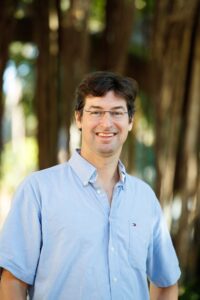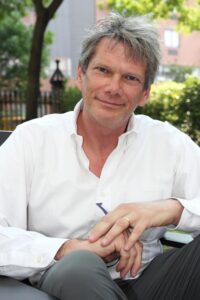One of them, coming with a less-than-stellar teaching record from another university, demanded tenure.
By Florence Fahringer
Original Air Date: June 14, 2024
Host: Yesterday, the New College Board of Trustees approved tenure for two professors, ignoring the objections of faculty and their union. Florence Fahringer was there.
Florence Fahringer: After the takeover of the New College board, one of the first actions taken by the new board majority was the denial of tenure to five professors, delaying the tenure vote to the following year. This move was so contentious that the faculty board member of the time announced his resignation during the meeting.
One professor whose tenure was kicked down the road, Hugo Viera Vargas, decided to sue the administration for violating its collective bargaining agreement with the faculty union by denying tenure to him and his colleagues. A year later, President Corcoran personally denied Viera Vargas tenure, claiming small class sizes.
Yesterday, the board met to grant tenure to another faculty member, as well as a faculty-member-to-be. The meeting opened with some New College math professors, decrying the possibility of tenuring these candidates during public comments.
Chris Kottke: Recently, when I’ve gone to conferences with other academic mathematicians, even my conservative colleagues who are sympathetic to this board on issues like DEI cite our well publicized tenure debacles when they tell me, “Wow, things are pretty bad at your college, huh?” and ask me if I really plan to stay.
Our tenure process and timeline are clearly articulated. In the cases before you today, the process was not followed. Faculty were asked to vote with vastly incomplete information, a tight turnaround, and given no rationale for doing so. The negative votes speak for themselves.

Bernhard Klingenberg
FF: The current faculty member up for tenure, professor Bernhard Klingenberg, had joined the college prior to the board takeover. Unlike his colleagues’ requests for tenure, Klingenberg did not receive a recommendation for tenure from the college’s faculty.
Amy Reid: The process is that the chair of the division solicits external evaluations from people who do not have close research relationships with the person being evaluated. In both of these cases, certainly in Dr. Klingenberg’s, he requested evaluations from three people with whom he regularly publishes. One of the letters that you were provided actually says this is just an informal letter because these academic scholars know that this is a violation of the process. So, regardless of my respect for Dr. Klingenberg, for the work that he has done here, and because of my respect for New College, I have to say no to this tenure because the process was violated, and in fact, the fact that it was moved up to you here is really a slap in the face to faculty.
FF: While Klingenberg is generally well-liked by his fellow faculty members, they voted against granting him tenure because it violates the approved process. Even before the board meeting, the faculty union filed a grievance over his case. This was not the case with the instant tenure of a new hire — David Mikics. Mikics is a professor currently working at the University of Houston, and a prolific columnist on Tablet Magazine, where he routinely derides the woke left and Angela Davis. Reid listed her concerns with approving his bid for tenure.
AR: So, for Dr. Mikics, someone I have not met, um … [chuckle], this is totally, it’s just again, a really inappropriate use of the system.

David Mikics
Colleagues voted strenuously against tenuring this person. Why? Primarily because we have absolutely no indication that he actually is interested in teaching. There was nothing in his letter; there was nothing in the letters written for him about his teaching. And the teaching evaluations he sent were not only bad in terms of the qualities that they talk about … I have never gotten a comment that I did not provide a syllabus for a class. Never in all my 29 years teaching here, plus multiple years at Yale and at Miami of Ohio. So that he has students saying, “It would be nice if there was a syllabus,” that is a huge red flag.
I’ll also say, he sent us evaluations from four classes: one of which apparently has eight students; one of which has, apparently, two students; another that has five students; and one that has four students. Two months ago, this board refused tenure to a very qualified candidate because their classes were small. The University of Houston — where Dr. Mikics teaches — has a student body 50 times the size of the New College faculty.
You mean to tell me that he has classes of two students regularly? These are the best teaching evaluations he could send us in response to questions about the credentials of these tenure candidates.
FF: In response to questions about the credentials of these tenure candidates, Corcoran muttered back a short sentence or two. His responses were not picked up by his microphone, and it happened enough times that audience members started shouting out that they couldn’t hear him. He adjusted his microphone, and this is what it picked up:
Richard Cocoran: There is a pathway, Trustee Reid, if you don’t think that we followed the collective bargaining agreement.
AR: I don’t.
FF: For once, concerns raised about the issue at hand actually broke the otherwise immutable partisan divisions of the board, as outsider appointee Charles Kesler tentatively echoed the concerns raised by Reid. Corcoran was quick to put him back in his place.
Charles Kesler: Yes, I mean, I think trustee Reid raises some important questions here. Although each of them intellectually seems worthy of tenure, I don’t want to see the precedent set procedurally to be adopted and followed by us as rules going forward in other cases.
RC: Trustee Kesler, as you recall in Monday’s meeting, the entire collective bargaining agreement book is open, and those discussions between the faculty representatives at the table and the administration, I think it’s a concerted effort on both parts to clarify in the CBA that process, and the details of that process, and not have any issues with it moving forward.
CK: Well, that’s good. That’s encouraging.
FF: After this, another outsider appointee, Trustee Ryan Anderson, chipped in with his own question; in his response, Corcoran revealed that the currently untenured Mikics doesn’t just want tenure — he requires it as a condition of his employment. Reid seemed flabbergasted. She explained the process by which faculty normally request tenure upon arrival.
AR: As we have seen with a number of my colleagues who have left, people often — when they have tenure at one place and move to another — are able to have a leave of absence at one place, so that they hold their tenure, and that they can go through a tenure process at another institution, whether that takes one or two years. So if Dr. Mikics is not willing to do that, I’m wondering why.
FF: Chair of the board Debra Jenks finally pushed a vote on the matter. It looked possible that it might not pass, as the first few votes were split between Yay’s and Nay’s. The first sign of trouble was the rebellious Kesler, who despite sharing Reid’s reservations, decided to vote in favor of approving tenure. The outsider appointees who followed his roll-called vote fell in line. Welcome to New College, tenured professor David Mikics.
FF: This is Florence Fahringer, reporting for WSLR News.
Note: Dr. David Mikics contacted WSLR News after publication of the report. WSLR gave him a chance to respond to what was said during the June 13 meeting. Here is what he says: “Before arriving at New College, I taught for 35 years in the English Department and the Honors College at the University of Houston, where I won the university’s most prestigious teaching award. Each year for decades I team-taught a great books class for freshmen, and my colleagues have had nothing but praise for my efforts. My letter of application to New College devoted its opening page to my strengths in teaching, since I know that my new institution focuses on the classroom — that’s why I’m here, and why I’m so excited about the prospects of a new era at New College. The reporter from WSLR did not attempt to contact me for this story, and so I welcome the opportunity to set the record straight!”
WSLR News aims to keep the local community informed with our 1/2 hour local news show, quarterly newspaper and social media feeds. The local news broadcast airs on Wednesdays and Fridays at 6pm.